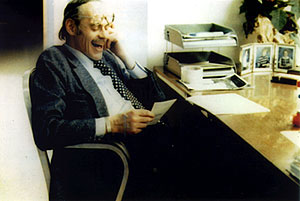Dr. David Glasser
(1933-1989)
The Dr. David Glasser Memorial Tuberculosis Control and Prevention Award was established in 1996 in honor of Dr. David Glasser's vision of treating tuberculosis with directly observed therapy in Baltimore City. This method was instrumental in reducing the incidence of tuberculosis disease in the City and Maryland. The award is presented an individual for significant contributions to the prevention and control of tuberculosis in Maryland.
 David M. Glasser, MD, MPH, was a clinical pioneer dedicated to improving public health. His main contributions were his work in control of tuberculosis, HIV infection and sexually transmitted diseases.
David M. Glasser, MD, MPH, was a clinical pioneer dedicated to improving public health. His main contributions were his work in control of tuberculosis, HIV infection and sexually transmitted diseases.
As a young medical graduate, he served in Vietnam with the U.S. Army Medical Corps and the Vietnamese government.
While in Vietnam, he used money smuggled to him in hollowed out books to transform a deteriorating TB hospital to an effective and efficient TB treatment hospital.
In 1973, he began serving with the Baltimore City Health Department as the Director of the Bureau of Disease Control. At that time, the city had the highest per capita rate of tuberculosis in the nation. He managed this challenge on many fronts. He successfully passed City Council ordinances which overhauled the system for reporting of TB cases, including a requirement that pharmacies report to the health department any patient placed on TB treatment
This improved identification of TB cases,and provided reliable information on the appropriateness of TB treatment by the private sector. In 1981, he instituted directly observed therapy for most City TB cases, which ensured complete and appropriate treatment.
At that time only one other city in the U.S. was using DOT, which has now become the world-wide standard of care for TB treatment. He centralized TB treatment in Baltimore City into one clinic and began a program to provide 'TB Clinical Nurse Specialists' who were able to provide a high level of TB care.
He introduced incentives to promote compliance with TB treatment and collaborated with the City Detention Center and HIV care clinics to establish TB screening and prevention in special populations. He partnered with Johns Hopkins University on public health clinical research. While other U.S. cities had stable or increasing rates of TB in the 1980's and 90's, Baltimore's rate steadily declined (from 35.6 / 100,000 in 1981 to 9.2 in 2001).1
In other areas of public health, Dr. Glasser was an early proponent of needle-exchange programs and programs for AIDS prevention and education. Patient care was his first priority when he proposed innovative work standards and developed operating procedures for TB care. His ingenuity and dedication significantly influenced the practice of TB control.
1Chaulk CP, Moore-Rice K, Rizzo R, Chaisson RE. Eleven years of community-based directly observed therapy for tuberculosis. JAMA 1995; 274:945-951.

